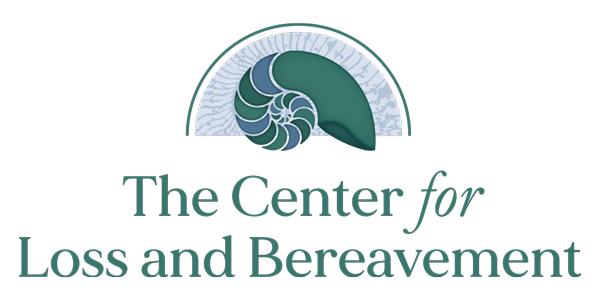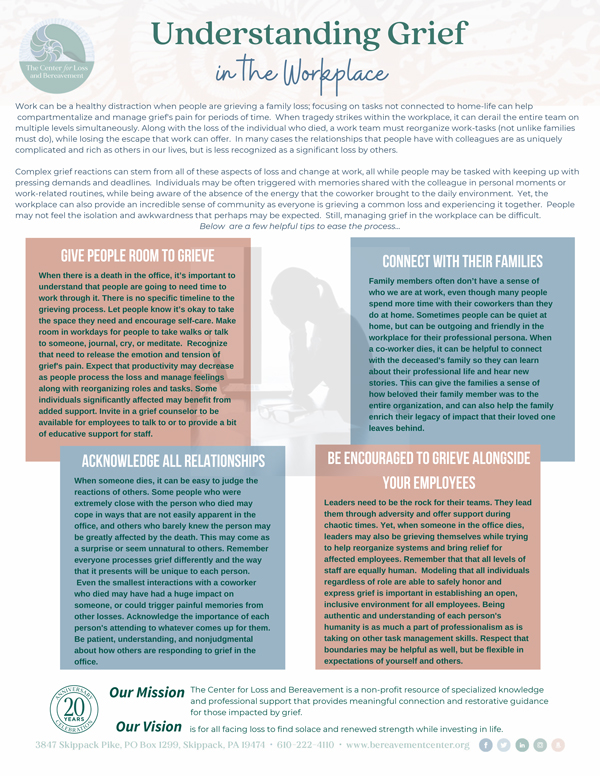CLB Tip Sheets
Understanding Grief in the Workplace
Work can be a healthy distraction when people are grieving a family loss; focusing on tasks not connected to home-life can help compartmentalize and manage grief’s pain for periods of time. When tragedy strikes within the workplace, it can derail the entire team on multiple levels simultaneously. Along with the loss of the individual who died, a work team must reorganize work-tasks (not unlike families must do), while losing the escape that work can offer. In many cases the relationships that people have with colleagues are as uniquely complicated and rich as others in our lives, but is less recognized as a significant loss by others.
Complex grief reactions can stem from all of these aspects of loss and change at work, all while people may be tasked with keeping up with pressing demands and deadlines. Individuals may be often triggered with memories shared with the colleague in personal moments or work-related routines, while being aware of the absence of the energy that the coworker brought to the daily environment. Yet, the workplace can also provide an incredible sense of community as everyone is grieving a common loss and experiencing it together. People may not feel the isolation and awkwardness that perhaps may be expected. Still, managing grief in the workplace can be difficult.
Below are a few helpful tips to ease the process…
Give People Room to Grieve
When there is a death in the office, it’s important to understand that people are going to need time to work through it. There is no specific timeline to the grieving process. Let people know it’s okay to take the space they need and encourage self-care. Make room in workdays for people to take walks or talk to someone, journal, cry, or meditate. Recognize that need to release the emotion and tension of grief’s pain. Expect that productivity may decrease as people process the loss and manage feelings along with reorganizing roles and tasks. Some individuals significantly affected may benefit from added support. Invite in a grief counselor to be available for employees to talk to or to provide a bit of educative support for staff.
Connect With Their Families
Family members often don’t have a sense of who we are at work, even though many people spend more time with their coworkers than they do at home. Sometimes people can be quiet at home, but can be outgoing and friendly in the workplace for their professional persona. When a co-worker dies, it can be helpful to connect with the deceased’s family so they can learn about their professional life and hear new stories. This can give the families a sense of how beloved their family member was to the entire organization, and can also help the family enrich their legacy of impact that their loved one leaves behind.
Acknowledge All Relationships
When someone dies, it can be easy to judge the reactions of others. Some people who were extremely close with the person who died may cope in ways that are not easily apparent in the office, and others who barely knew the person may be greatly affected by the death. This may come as a surprise or seem unnatural to others. Remember everyone processes grief differently and the way that it presents will be unique to each person. Even the smallest interactions with a coworker who died may have had a huge impact on someone, or could trigger painful memories from other losses. Acknowledge the importance of each person’s attending to whatever comes up for them. Be patient, understanding, and nonjudgmental about how others are responding to grief in the office.
Be Encouraged to Grieve Alongside Your Employees
Leaders need to be the rock for their teams. They lead them through adversity and offer support during chaotic times. Yet, when someone in the office dies, leaders may also be grieving themselves while trying to help reorganize systems and bring relief for affected employees. Remember that that all levels of staff are equally human. Modeling that all individuals regardless of role are able to safely honor and express grief is important in establishing an open, inclusive environment for all employees. Being authentic and understanding of each person’s humanity is as much a part of professionalism as is taking on other task management skills. Respect that boundaries may be helpful as well, but be flexible in expectations of yourself and others.
Join Our
Mailing List
Donate
Today
Request
Information

Affiliations
• NACG
• CBEM Changemaker
• ADEC
• Charity Navigator
Quick Links
About Us
Individual & Family Grief Counseling
Volunteer
News
Grief Support Resources
Contact
Ph: 610-222-4110
Fax: 610-222-4116
3847 Skippack Pike
P.O. Box 1299
Skippack, PA 19474
Support The Center For
Loss and Bereavement
